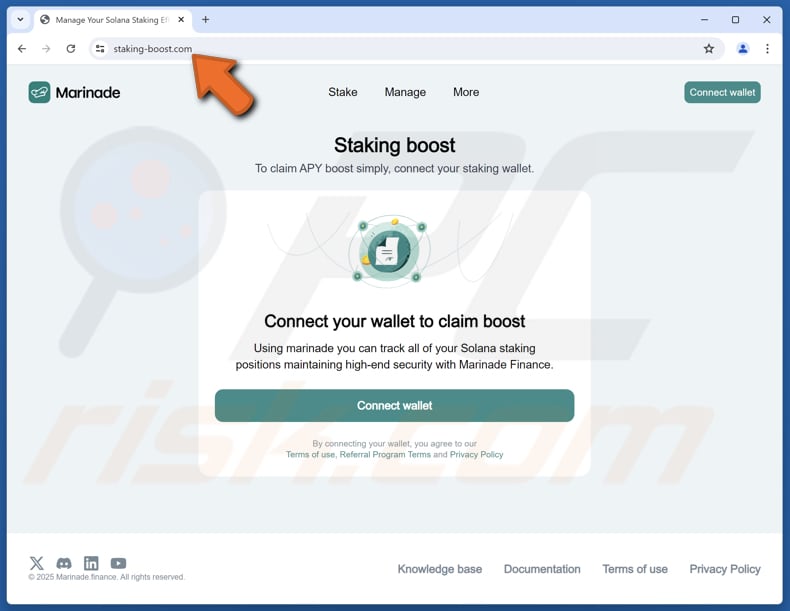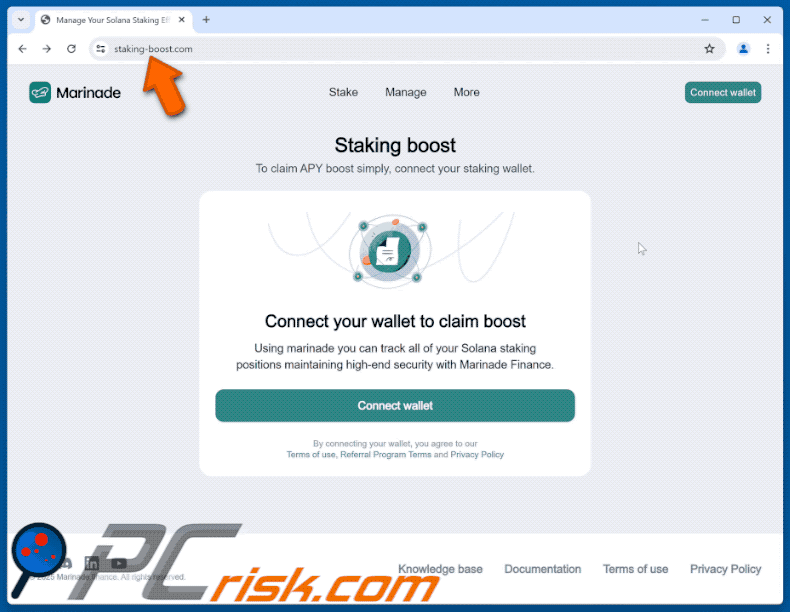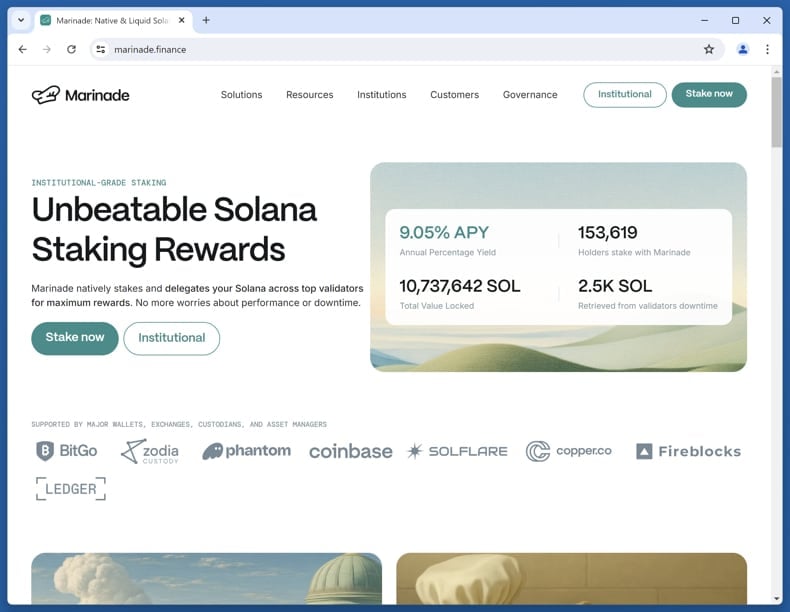How to identify fake platforms like "Marinade Staking Boost"
Phishing/ScamAlso Known As: Fake Marinade Staking Boost website
Get free scan and check if your device is infected.
Remove it nowTo use full-featured product, you have to purchase a license for Combo Cleaner. Seven days free trial available. Combo Cleaner is owned and operated by RCS LT, the parent company of PCRisk.com.
What is the "Marinade Staking Boost" scam?
Our analysis of staking-boost[.]com has revealed that it is a replica of the legitimate Marinade website (marinade.finance). The fake page is designed to deceive users into thinking they are eligible to claim a special offer. Those who fall for the scam risk substantial financial loss.

"Marinade Staking Boost" scam website overview
Marinade (marinade.finance) is a platform that helps users earn more from staking your SOL (Solana) by automatically choosing the best validators. It offers two options: stake SOL normally or use "liquid staking" to get mSOL—token users can still use while their SOL is staked.
The fraudulent website promotes a "Staking Boost". It claims that users can increase their APY by connecting their staking wallet. It encourages visitors to link connect wallets to claim this supposed boost. However, this site is fake and designed to deceive users into disclosing personal information.
On the site, users are requested to provide their 12-word (or 24-word) recovery phrase. Disclosing this information provides scammers with access to cryptocurrency wallets. Once inside, scammers can transfer the victim's cryptocurrency from their wallet directly to a wallet they control/own.
Because blockchain transactions cannot usually be undone, victims rarely have any chance to get their stolen money back. As a result, interacting with these scam sites almost always results in permanent fund loss.
| Name | Fake Marinade Staking Boost website |
| Threat Type | Scam, Social Engineering, Fraud |
| Fake Claim | Users can increase their APY by connecting their staking wallet |
| Disguise | Marinade platform (marinade.finance) |
| Related Domain | rewards-marinade[.]finance, stake-boost[.]com, staking-boost[.]com |
| Detection Names (staking-boost[.]com) | Ermes (Not Recommended), Trustwave (Phishing), Full List Of Detections (VirusTotal) |
| Symptoms | Unofficial domain, lack of official verification, unrealistic claims, too good-to-be-true promises |
| Distribution methods | Fake social media accounts, deceptive websites, rogue online advertisements |
| Damage | Cryptocurrency theft |
| Malware Removal (Windows) |
To eliminate possible malware infections, scan your computer with legitimate antivirus software. Our security researchers recommend using Combo Cleaner. Download Combo CleanerTo use full-featured product, you have to purchase a license for Combo Cleaner. 7 days free trial available. Combo Cleaner is owned and operated by RCS LT, the parent company of PCRisk.com. |
Similar scams in general
Fake sites like the Marinade Staking Boost scam imitate real platforms to trick users into connecting their wallets and sharing sensitive information. Those who are deceived often end up losing money. Therefore, users are advised to always double-check website addresses and stick to official, trusted sources.
Examples of other crypto scams are the fake "LoopedHYPE (LHYPE) Airdrop", "Binance Airdrop", and "1inch Airdrop" websites.
How did I open a scam website?
Scammers often use fake or hacked social media profiles, especially on platforms like X (formerly Twitter) to promote their scams. They also distribute fraudulent websites via notifications from unreliable sites, use misleading pop-ups, and craft deceptive online advertisements.
Users may also end up on these scam websites by clicking links in phishing emails or while visiting torrent sites, illegal streaming platforms, and other websites that use questionable advertising networks. Additionally, adware present on a device can redirect users to these fraudulent pages.
How to avoid visiting scam pages?
Avoid interacting with pop-ups, ads, or other content on suspicious pages, and do not grant permission for these sites to send you notifications. Be cautious with unexpected or irrelevant emails and messages, especially from unknown senders, as they may contain harmful links or attachments—only open them if you are certain they are safe.
Always download software from trusted sources like official app stores or reputable websites. Keep your operating system and applications updated regularly, and safeguard your device with reliable security software. If your computer is already infected with unwanted apps, we recommend running a scan with Combo Cleaner Antivirus for Windows to automatically eliminate them.
The appearance of "Marinade Staking Boost" scam website (GIF):

Another example of a scam website (rewards-marinade[.]finance) promoting Marinade Staking Boost scam:
![Marinade Staking Boost scam website (rewards-marinade[.]finance)](/images/stories/screenshots202512/marinade-staking-boost-scam-update-2025-12-16-another-variant.jpg)
The original Marinade website (marinade.finance):

Instant automatic malware removal:
Manual threat removal might be a lengthy and complicated process that requires advanced IT skills. Combo Cleaner is a professional automatic malware removal tool that is recommended to get rid of malware. Download it by clicking the button below:
DOWNLOAD Combo CleanerBy downloading any software listed on this website you agree to our Privacy Policy and Terms of Use. To use full-featured product, you have to purchase a license for Combo Cleaner. 7 days free trial available. Combo Cleaner is owned and operated by RCS LT, the parent company of PCRisk.com.
Quick menu:
- What is Fake Marinade Staking Boost website?
- How to identify a pop-up scam?
- How do pop-up scams work?
- How to remove fake pop-ups?
- How to prevent fake pop-ups?
- What to do if you fell for a pop-up scam?
How to identify a pop-up scam?
Pop-up windows with various fake messages are a common type of lures cybercriminals use. They collect sensitive personal data, trick Internet users into calling fake tech support numbers, subscribe to useless online services, invest in shady cryptocurrency schemes, etc.
While in the majority of cases these pop-ups don't infect users' devices with malware, they can cause direct monetary loss or could result in identity theft.
Cybercriminals strive to create their rogue pop-up windows to look trustworthy, however, scams typically have the following characteristics:
- Spelling mistakes and non-professional images - Closely inspect the information displayed in a pop-up. Spelling mistakes and unprofessional images could be a sign of a scam.
- Sense of urgency - Countdown timer with a couple of minutes on it, asking you to enter your personal information or subscribe to some online service.
- Statements that you won something - If you haven't participated in a lottery, online competition, etc., and you see a pop-up window stating that you won.
- Computer or mobile device scan - A pop-up window that scans your device and informs of detected issues - is undoubtedly a scam; webpages cannot perform such actions.
- Exclusivity - Pop-up windows stating that only you are given secret access to a financial scheme that can quickly make you rich.
Example of a pop-up scam:

How do pop-up scams work?
Cybercriminals and deceptive marketers usually use various advertising networks, search engine poisoning techniques, and shady websites to generate traffic to their pop-ups. Users land on their online lures after clicking on fake download buttons, using a torrent website, or simply clicking on an Internet search engine result.
Based on users' location and device information, they are presented with a scam pop-up. Lures presented in such pop-ups range from get-rich-quick schemes to fake virus scans.
How to remove fake pop-ups?
In most cases, pop-up scams do not infect users' devices with malware. If you encountered a scam pop-up, simply closing it should be enough. In some cases scam, pop-ups may be hard to close; in such cases - close your Internet browser and restart it.
In extremely rare cases, you might need to reset your Internet browser. For this, use our instructions explaining how to reset Internet browser settings.
How to prevent fake pop-ups?
To prevent seeing pop-up scams, you should visit only reputable websites. Torrent, Crack, free online movie streaming, YouTube video download, and other websites of similar reputation commonly redirect Internet users to pop-up scams.
To minimize the risk of encountering pop-up scams, you should keep your Internet browsers up-to-date and use reputable anti-malware application. For this purpose, we recommend Combo Cleaner Antivirus for Windows.
What to do if you fell for a pop-up scam?
This depends on the type of scam that you fell for. Most commonly, pop-up scams try to trick users into sending money, giving away personal information, or giving access to one's device.
- If you sent money to scammers: You should contact your financial institution and explain that you were scammed. If informed promptly, there's a chance to get your money back.
- If you gave away your personal information: You should change your passwords and enable two-factor authentication in all online services that you use. Visit Federal Trade Commission to report identity theft and get personalized recovery steps.
- If you let scammers connect to your device: You should scan your computer with reputable anti-malware (we recommend Combo Cleaner Antivirus for Windows) - cyber criminals could have planted trojans, keyloggers, and other malware, don't use your computer until removing possible threats.
- Help other Internet users: report Internet scams to Federal Trade Commission.
Frequently Asked Questions (FAQ)
What is a crypto scam?
These are scams that present false promises and misleading information to trick users into taking steps that can compromise their security, privacy, or finances. Typically, crypto-related scams are disguised as official platforms.
What is the purpose of a crypto scam?
The goal of these scams is to trick users into connecting their wallets, sharing private information, or sending cryptocurrency.
Why do I encounter scam websites?
Scammers promote their schemes using fake or hacked social media accounts, misleading ads, and deceptive pop-ups. Users can also be directed to scam sites through phishing emails, torrent or illegal streaming sites (and similar platforms that use shady advertising networks), and adware on their devices.
Will Combo Cleaner protect me from scam sites?
Yes, Combo Cleaner safeguards users from scams by identifying malicious or misleading website content and blocking access to dangerous or harmful sites.
Share:

Tomas Meskauskas
Expert security researcher, professional malware analyst
I am passionate about computer security and technology. I have an experience of over 10 years working in various companies related to computer technical issue solving and Internet security. I have been working as an author and editor for pcrisk.com since 2010. Follow me on Twitter and LinkedIn to stay informed about the latest online security threats.
PCrisk security portal is brought by a company RCS LT.
Joined forces of security researchers help educate computer users about the latest online security threats. More information about the company RCS LT.
Our malware removal guides are free. However, if you want to support us you can send us a donation.
DonatePCrisk security portal is brought by a company RCS LT.
Joined forces of security researchers help educate computer users about the latest online security threats. More information about the company RCS LT.
Our malware removal guides are free. However, if you want to support us you can send us a donation.
Donate
▼ Show Discussion